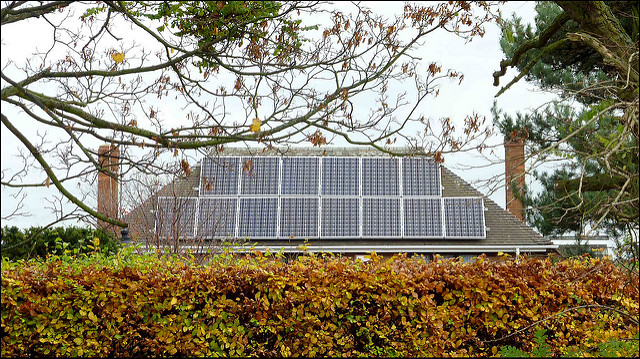
Sunday evening, Tesla announced that it would be partnering with Panasonic to create photovoltaic cells and modules at SolarCity’s new Buffalo, New York factory—if Tesla’s shareholders approve the company’s purchase of SolarCity, that is.
Tesla currently has a partnership with Panasonic to help build its Gigafactory outside of Reno, NV, and manufacture batteries in it. Last year, Tesla announced its foray into stationary battery manufacturing, which it said was a natural extension of its electric vehicle business. The Gigafactory has just begun churning out batteries for Tesla vehicles and so-called Powerwalls (7kWh stationary batteries for residential use), as well as battery systems for industrial use, which Tesla calls the Powerpack.
Panasonic has decades of experience building photovoltaic cells, and Tesla says if the SolarCity deal goes through, Panasonic will start manufacturing in the Buffalo facility sometime in 2017. “Tesla intends to provide a long-term purchase commitment for those cells from Panasonic,” the electric vehicle company said in a press release.
For Tesla, the ultimate goal is to provide a complete renewable energy system for residential customers. “Tesla will use the cells and modules in a solar energy system that will work seamlessly with Powerwall and Powerpack, Tesla’s energy storage products,” the press release says. Tesla has already hinted that it will reveal a prototype for a solar-roof-plus-stationary-storage system for residential customers in an event on October 28.
Now Tesla and SolarCity must convince their shareholders to accept the deal between the two companies. Tesla made the offer to buy Solar City for $2.6 billion in June in an all-stock deal that would give SolarCity investors 0.11 Tesla shares for every SolarCity share they own. Tesla claimed at the time that the deal would generate $150 million in “cost synergies,” including lower marketing costs and selling SolarCity products from Tesla storefronts.
Some investors and analysts have eyed the deal cautiously, though, pointing out that Tesla has not turned a profit in years. Colin Rusch, an analyst from Oppenheimer, said last week that Tesla could need up to $12.5 billion in cash through 2018 to merge Tesla and SolarCity. Tesla last raised $1.46 billion in an equity offering in May.
Still, SolarCity and Tesla were able to fast track their proposed merger because US antitrust regulators determined that the two companies shared little business and a merger would not affect competition in each of their respective markets. Shareholders from both companies will vote on the deal on November 17.
reader comments
34